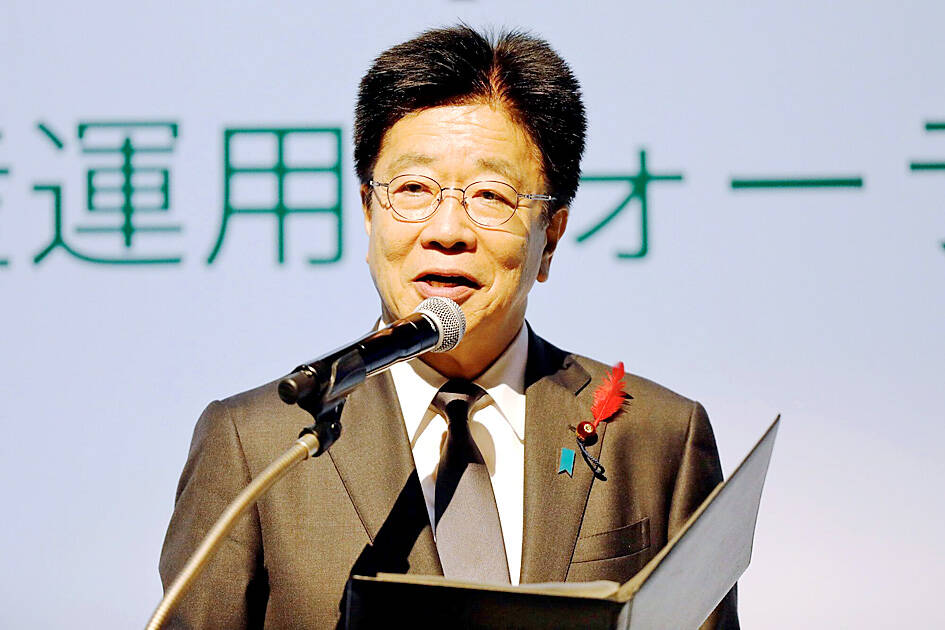Sudden moves in Japan’s currency hurt companies and households, and that impact requires close government scrutiny, newly appointed Japanese Minister of Finance Katsunobu Kato said in a group interview yesterday, following a pronounced slide in the yen in recent days.
“The problem is sharp currency fluctuations can have a negative impact on business activity and does not help citizens’ lives,” he said.
He also called for clear central bank communication and said that the government would quickly put together an economic package.

Photo: Kosuke Okahara, Bloomberg
Japan’s currency is trading at about ¥148.40 against the US dollar compared with a high of 141.66 just a week ago, as investors try to determine the direction of Ishiba’s new administration.
Strong US jobs data on Friday gave the currency an additional shunt as market players lowered their expectations for the size of US Federal Reserve interest rate cuts.
“We will carefully watch the impact of [foreign exchange reserves] forex moves on the Japanese economy and people’s lives,” Kato said.
Japan has already spent more than US$100 billion this year propping up the yen and would likely want to avoid having to intervene in markets again if possible.
Kato did not specify what action the government might take if the yen weakens further.
The Japan leadership race and comments from the new government have contributed to recent volatility in the yen.
Japan’s economy was not ready for higher interest rates, Ishiba said last week, prompting the currency to fall. Later he appeared to walk back some of those comments, suggesting he is still in the process of judging how best to communicate with markets.
Kato said he expects the Bank of Japan (BOJ) to communicate carefully with the market and manage policy appropriately toward its price goal.
The government and the central bank last week confirmed a joint accord that states their commitment to a 2 percent inflation target.
A BOJ rate hike at the end of July caught out some market participants and was seen contributing to a market meltdown that resulted in Japan’s worst-ever daily slide in stock prices. The bank meets at the end of this month and is widely expected to keep rates unchanged.
The specifics of monetary policy should be left to the central bank, Kato said.
To protect households from the impact of higher prices and to support growth, Ishiba last week ordered a package of economic measures and a supplementary budget to help fund it. The upcoming package is to include cash handouts for low-income households and regional economies.
“We want to put this together as soon as possible and take more concrete steps,” Kato said.
The additional spending would likely add to Japan’s debt burden, further straining the country’s already tough fiscal situation.
Japan’s debt reached 255 percent of GDP this year, the International Monetary Fund said.
Kato said that the government has to keep next year’s primary balance and fiscal health goal in mind while working on spending reform.
The government would continue to strengthen the competitiveness of the semiconductor industry, he added.
“The government’s stance has been [that] the chips sector is of key importance for economic national security,” Kato said. “We will keep following through on plans to support it.”

In Italy’s storied gold-making hubs, jewelers are reworking their designs to trim gold content as they race to blunt the effect of record prices and appeal to shoppers watching their budgets. Gold prices hit a record high on Thursday, surging near US$5,600 an ounce, more than double a year ago as geopolitical concerns and jitters over trade pushed investors toward the safe-haven asset. The rally is putting undue pressure on small artisans as they face mounting demands from customers, including international brands, to produce cheaper items, from signature pieces to wedding rings, according to interviews with four independent jewelers in Italy’s main

Japanese Prime Minister Sanae Takaichi has talked up the benefits of a weaker yen in a campaign speech, adopting a tone at odds with her finance ministry, which has refused to rule out any options to counter excessive foreign exchange volatility. Takaichi later softened her stance, saying she did not have a preference for the yen’s direction. “People say the weak yen is bad right now, but for export industries, it’s a major opportunity,” Takaichi said on Saturday at a rally for Liberal Democratic Party candidate Daishiro Yamagiwa in Kanagawa Prefecture ahead of a snap election on Sunday. “Whether it’s selling food or

CONCERNS: Tech companies investing in AI businesses that purchase their products have raised questions among investors that they are artificially propping up demand Nvidia Corp chief executive officer Jensen Huang (黃仁勳) on Saturday said that the company would be participating in OpenAI’s latest funding round, describing it as potentially “the largest investment we’ve ever made.” “We will invest a great deal of money,” Huang told reporters while visiting Taipei. “I believe in OpenAI. The work that they do is incredible. They’re one of the most consequential companies of our time.” Huang did not say exactly how much Nvidia might contribute, but described the investment as “huge.” “Let Sam announce how much he’s going to raise — it’s for him to decide,” Huang said, referring to OpenAI

The global server market is expected to grow 12.8 percent annually this year, with artificial intelligence (AI) servers projected to account for 16.5 percent, driven by continued investment in AI infrastructure by major cloud service providers (CSPs), market researcher TrendForce Corp (集邦科技) said yesterday. Global AI server shipments this year are expected to increase 28 percent year-on-year to more than 2.7 million units, driven by sustained demand from CSPs and government sovereign cloud projects, TrendForce analyst Frank Kung (龔明德) told the Taipei Times. Demand for GPU-based AI servers, including Nvidia Corp’s GB and Vera Rubin rack systems, is expected to remain high,